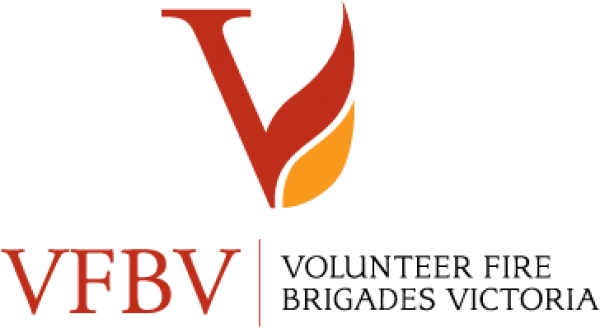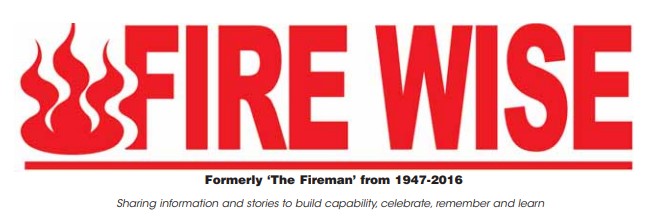Everyone can help someone
By Adam Barnett, VFBV Chief Executive Officer
Later this month we will celebrate National Volunteer Week, which this year runs between the 20th–26th May 2024.
This year’s theme is ‘Something for Everyone’ which fits emergency service volunteering quite nicely considering the myriad of roles available within CFA. The key message for this year’s theme is about emphasising that there’s a place for everyone in the world of volunteering.
And while my go to Ronald Reagan quote is usually his tongue in cheek wise crack: “The nine most terrifying words in the English language are: I’m from the government and I’m here to help”, I will pivot to the more subject appropriate quote of “We can’t help everyone, but everyone can help someone.”
As you would expect, I spend a lot of my time talking about all things ‘volunteer’ to many people who may not volunteer themselves. This is often the case when dealing with government, the public service and even business groups. Sadly, it has also become more common when dealing with people within the emergency management sector itself, and even when meeting some new CFA staff.
While I don’t think being an emergency service volunteer should be a mandatory prerequisite, it is important for those that have influential roles or responsibilities within the sector to have a very good understanding of the volunteer ethos, its culture, and how volunteers should be encouraged, respected, supported and appreciated.
When people roll their eyes over what they deem to be a pretty inconsequential complaint by volunteers, I ask how many of their staff would show up for work if the agency sent out an email advising all staff they wouldn’t be paid for the next two weeks due to budget cuts.
Think of all the things an organisation would need to do to encourage its staff to still want to come to work for free, and then think about what’s required to run a fully volunteer organisation not for two weeks, but for 365 days of the year.
Of late, some think its is totally acceptable to mirror arrangements for employees and expect volunteers to be treated exactly the same. Follow this through its logical conclusion, and if roles were reversed and employees had to give up their salaries but still continue to come to work – imagine the chaos and low morale.
Why then is it so difficult to understand treating volunteers like employees will similarly result in chaos and low morale.
And while just being a volunteer does not automatically qualify you as understanding these things or being proficient in the principles of volunteer management, it certainly goes some way to provide valuable context and personal experiences that may enlighten further development down the track.
For those that do have a background in volunteering, more often than not it is often involvement in non-formal volunteering, which is kind of the- ‘all care and no responsibility’ flavour of volunteering. That’s not to say that this type of volunteering is bad, and I certainly mean no disrespect - it just simply does not create a reference point for people who have not had experience in formal volunteering for an emergency service that also includes a significant amount of obligation, the real risk of hurting yourself, as well as the removal of the flexibility to volunteer where and when they would like.
Anyone with a pager knows that emergency incidents rarely occur when convenient, nor can they be planned or blacked out in one’s diary when planning the week.
It’s not until you start truly appreciating the sacrifices that CFA and other emergency service volunteers make that you can start to really appreciate and respect it. Then there is the type of incidents emergency service volunteers frequently attend that can weigh on your soul. I often describe CFA volunteers as being with Victorians on what is often the worse day of their lives. Therefore, the mental toll is as real as the physical, and often requires significant cognitive energy to ensure these aftereffects are managed and treated.
All this is to say, that when people tell me they really respect volunteers, I often pause to consider the context with which the statement is made. The words are easy, but genuine respect can only be given if the role and duty that emergency service volunteers give is truly understood. Only then can one really value and respect something.
I reflect on the occasions when someone has been accused of disrespecting CFA volunteers, and this is often followed by an exclamation that no this isn’t so - they love volunteers and really admire what they do.
It then takes patience and deliberate effort to walk them through the logic of an ignorant though well-meaning sentiment, versus an informed knowledge of and appreciation of how volunteers differ from a paid workforce. Again, these sentiments are often not made maliciously, but the effect is none the less often the same.
In this vein, I wish to use this year’s Volunteer Week to continue to contribute towards a better understanding of the value that emergency service volunteers bring to Victoria.
We know from the work we did with Lateral Economics a few years back, that Victoria’s emergency service volunteers generate more than $2.5 billion dollars of value to Victoria each and every year. Of that, $1.4 billion is what we call emergency management value per year. This is defined as the contribution of volunteers to the direct outcomes achieved by emergency services before, during and after emergencies. This includes response, but also considers prevention/mitigation, preparedness, as well as recovery.
It should be pointed out this is not the replacement value and only represents a very conservative partial cost approach to quantify the value. That is value and saved money that gets diverted to schools, hospitals and other essential programs.
The more misunderstood component of the $2.5 billion is the $900 million that is generated every year that emergency service volunteers provide in community strengthening value. This refers to the broader and sometimes indirect ways in which emergency service volunteering helps to strengthen communities. In other words - visible, active, positive emergency volunteerism in a community can make a difference to society as a whole. Concepts fire service outcome measurements do not even pretend to contemplate.
Rather than paraphrase, I’ll reproduce the observations of Nicholas Gruen the CEO from Lateral Economics after studying Victoria’s emergency service volunteers. Nicholas is a widely published and respected Australian economist, visiting professor at King’s College London’s Policy Institute, and is the former chair of the Australian Centre for Social Innovation.
“Thinkers and philosophers have deliberated through the eons over the question of which is more important—the individual or society? The discipline of economics is built on ‘methodological individualism’ in which the wellbeing and functioning of groups is seen as no more than the sum of their individual constituents. Nevertheless economics’ ‘founding father’, Adam Smith, had a different view, building his economics around a view of humanity set out in his first book – The Theory of Moral Sentiments in which individuals became individuals as we know them through the process of being socialised into the values of their family and, beyond that, their community.”
“It is not necessary to decide the question definitively for our purposes. What we can say is that certain outcomes of the 3Vs [Volunteers, Volunteering & Volunteerism] are far more concrete than others. The value of saving a house from being engulfed in a bushfire is clear to all conceptually, and, at least in principle, it is easy to measure its economic value.”
“This is far less true of the value individuals get from volunteering and even less true of the value communities gain from individuals within them volunteering. In this regard those close to volunteering— volunteers themselves and many who help organise them—are anxious that the value creation that is easiest to measure not crowd out that which is no less real for being difficult to measure.”
So during this year’s Volunteer Week while I acknowledge the incredible work our members do each and every day in protecting their communities from fire and other emergencies, I would also like to especially thank you for the community building, social capital and cohesion you each contribute to, that makes up a large part of the public value generated by your efforts.
‘Public value’ is the philosophy of performance measurement used to evaluate the value produced normally but not exclusively by public bodies and that is ‘consumed’ collectively by the citizenry rather than individually by clients or customers.
When you drill down into the four main domains that are often used to measure public value, it is clear the value proposition that CFA generates for Victoria. Public value can be measured by the outcomes achieved; the extent to which the organisation and activities are trusted and perceived to be legitimate; the extent to which the services delivered are high quality and match the need; and finally the extent to which an organisation is achieving maximal benefits with minimal resources. When you compare the public value of some current government priorities using these measurements, the disparity is clear.
With that in mind, we will be closely monitoring the Victorian budget due early this month. CFA volunteers will have every right to judge the tangible level of respect that the Victorian Government really has for its emergency service volunteers by way of its investment and resourcing (or lack thereof) of these essential emergency services.
If CFA and volunteer emergency services are truly judged by their public value and not by other measures such as political convenience, or industrial relations alignment, then CFA volunteers and the millions of Victorians that rely on their services will have nothing to worry about.
And while I fear this may not be the case, please take this moment to celebrate the incredible work that you do and the lives that you change for the better - each and every day.
SOP Feedback

A reminder that we are seeking feedback on various Standard Operating Procedures (SOPs) that are out for consultation.
Thirteen SOPs have been modified and ten are now available for review. These are SOP 3.01 Management of Junior Members; 5.05 Use of CFA Equipment; 7.01 Local Procedure Development; 7.05 Water Supplies for Firefighting; 7.07 Station Siren Use; 8.01 Incident Controller and CFA Agency Commander; 8.04 Transfer of Control; 9.13 Keeping Logs and Documents; 9.16 Media Management; and 9.18 Use of Personal Mobile Devices During Incidents.
Given the importance of SOPs in CFA’s operational doctrine, VFBV encourages all senior volunteers to make themselves familiar with the proposed changes and provide feedback ASAP.
Please visit the VFBV website to access drafts and change logs to help guide your feedback. A feedback survey is also available from the VFBV website for those who prefer to provide feedback that way.
National Volunteer Week
The week of 20-26 May is National Volunteer Week, a week that provides an opportunity to highlight the important role of volunteers in our communities and invites people not currently volunteering to give it a go.
The theme for National Volunteer Week is Something for Everyone. This recognises the diverse passions and talents everyone brings to the act of volunteering. It’s an invitation to explore the myriad of opportunities available, emphasising that there’s a place for everyone in the world of volunteering.
VFBV passes on our deep gratitude, respect and appreciation to all CFA volunteers for the work you do in your communities, 24/7. Victorians are safer because of your work and VFBV could not be more proud of you, your brigades and all those that support you in your work protecting lives and property.
We acknowledge all of Victoria’s emergency management volunteer workforce including volunteer first responders from VicSES, St John Ambulance, Ambulance Victoria, Life Saving Victoria, Coast Guard, Salvation Army, Red Cross and the Victorian Council of Churches Emergencies Ministry for their wonderful contribution.

VESEP

Applications are now open for the 2024 Volunteer Emergency Services Equipment Program (VESEP), with the closing date fast approaching.
VFBV has updated its Help Pack to assist brigades and groups with their applications. The Help Pack is available for download from the VFBV website.
VESEP provides grants of $2 for every $1 of Brigade or Group funding to assist brigades and groups in acquiring a wide range of additional equipment in recognition of the significant contribution emergency service volunteers provide in supporting Victorian communities.
In its 24th year, VESEP first started out as the Community Safety Emergency Support Program in 2000 and was designed in close consultation with VFBV, with the intent of being a grants program designed by volunteers with minimal administration required from volunteers.
VFBV wishes all CFA Brigades and Groups well with your applications.
VFBV Board positions

Vacancies on the VFBV Board will arise when the terms of four VFBV Board members expire on the 1st October 2024. Of the four members whose terms are expiring, two are eligible for re-appointment.
VFBV invites applications from any CFA volunteer who is motivated by the prospect of making a difference and believes they have the skills to contribute to the VFBV Board.
The role of a board member involves contributing to VFBV direction, policy determination and monitoring the performance and governance of the Association. This includes actively contributing to policy discussion, consulting with CFA volunteers and contributing to the identification and management of strategic issues.
VFBV is seeking applications from gender and culturally diverse candidates in addition to a diverse range of skills and experience including applications from diverse brigade types and classifications.
Members should familiarise themselves with the VFBV Board member role statement and key selection criteria available from the VFBV website or via the office at (03) 9886 1141.
Applications close on Monday 2nd September 2024.
CFA Memorial Service

On Sunday May 5th, the Annual CFA Memorial Service was held at the Victorian Emergency Services Memorial in Treasury Gardens in the Melbourne CBD to honour firefighters who have lost their lives in the line of duty.
This year’s service was particularly poignant as it acknowledged and recognised the loss of two of CFA’s long-serving members who died in the line of duty in the past year; Greg Godkin of Donald brigade in August 2023 and Garry Mallen of Portland brigade in January 2024.
If you were unable to attend the service, you can view a livestream of the service on CFA’s YouTube channel.
Volunteer unity
Thank you for members’ strong show of support!
Again in 2023/24, CFA Brigades and Groups showed it is more important than ever that volunteers have a strong, united, independent and credible voice with almost 95% of Brigades demonstrating strong support for VFBV’s important work representing and advocating for all CFA volunteers. Thank you to all that affiliated last year.
In the coming weeks, Brigade and Group secretaries will receive the 2024/25 renewal notices for your Brigade/Groups’ VFBV Affiliation and Welfare Fund subscriptions with a due date of 30th June, 2024.
The Board is determined that brigades/groups should benefit from the strong governance of the association and have reduced the affiliation rate from $84 to $75.
Those who pay VFBV affiliations before 30th June will be automatically entered into a draw to win one of four extremely worthwhile prizes valued at approximately $4,000. Prizes have, for the fourth year running, been donated by GAAM Emergency Products and Powdersafe and we sincerely appreciate their continued support.
We strongly encourage Brigades to also subscribe to the VFBV Welfare Fund. The Welfare Fund is a capital fund and an exclusive benefit to affiliated members with VFBV funding all the administration and operating costs ensuring 100% of funds received go directly to CFA volunteers experiencing personal hardship. The VFBV Welfare Fund provides small grants up to $5,000 to assist volunteer members and long service ex members and has distributed more than $2.5 million dollars to volunteers in need since its inception.

Fire Wise – May 2024 online only edition

The May 2024 edition of Fire Wise has been published online only, this edition and past editions are available from the Fire Wise website.
You can support Fire Wise and the role it plays as an independent voice in keeping volunteers informed by becoming a subscriber. To become a subscriber visit the Fire Wise website or contact the Managing Editor of Fire Wise, Gordon Rippon-King either by phone 0402 051 412 or email This email address is being protected from spambots. You need JavaScript enabled to view it.
ESF Residential Wellbeing Program Pilot

In April 2024 the Emergency Services Foundation (ESF) started a pilot Residential Wellbeing Program.
The pilot will involve six groups of ten people in residence for four days to work with two mental health counsellors familiar with the emergency services environment. The six pilot programs will take place between April and October this year and are open to members from ESF member agencies who met certain criteria.
For more information about the Residential Wellbeing Program and to register please visit the ESF website.
Recent articles on the VFBV website
Open for Consultation Dashboard
VFBV Board Vacancies – Invitation to Apply
Feedback Requested – Standard Operating Procedures (Various)
2024 VESEP Applications Now Open and VFBV Help Pack
CFA Annual Memorial Service 2024
Presumptive Legislation Update
Enjoy the VFBV monthly newsletter?
If you enjoy reading the VFBV newsletter each month, why not share it with your fellow volunteers?
Either share this page with others who may enjoy the articles or encourage other volunteers to sign up to receive their own copy via email each month here.
Want to read the VFBV 2-minute briefings from the CFA/VFBV Joint Committees?
The latest edition along with previous editions can be downloaded from the VFBV website here.
 News
News 
